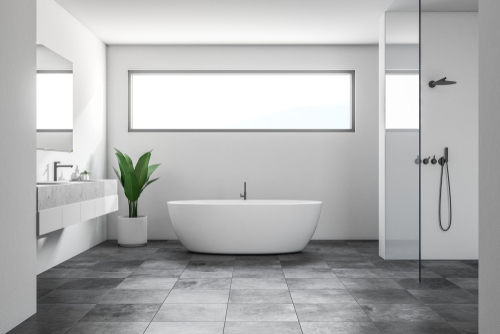If you are looking to change the look of a room instantly, change the floors! With the floor taking up so much real estate in any room, it can significantly influence the room’s overall style.
Before you go rushing to hardwood or ceramic for their everyday use in flooring, consider taking it up a notch and elevating your room with stone tile. If you are willing to invest a bit more than average, stone tile is an excellent option for adding functionality and richness to your room. With various stone flooring options, you can find the natural tile that is best suited for you!
Granite Tile
While granite is famous for its countertop usage, it is also a great flooring option for many of the same reasons. Granite tile is known and loved for its versatility and durability. Granite’s composition includes flecks, grains, and veins and is available in various natural colors, including brown, black, beige, white, red, green, and blue. With this versatility in colors comes versatility in design, making it complementary to many different home styles. Granite is also a practical flooring option due to its characteristics. As one of the hardest stones, granite is less prone to damage, which is essential for flooring due to the heavy traffic. In addition, when properly sealed, granite can be very resistant to moisture and staining, meaning that you can place it in kitchens and bathrooms.
Slate Tile
Slate tile is a relatively affordable natural stone flooring option that is incredibly durable, functional, and stylish. This visual appearance of slate tile offers a more rustic look. Slate generally comes in darker shades ranging from dark gray to black, featuring natural golds, greens, and blues. The coloring of slate, along with its rough texture, makes it a very forgiving floor material with the ability to hide dirt and damage more easily. In addition, slate is a hard stone, making it relatively resistant to scrapes, scratches, or dents. Adding to its functionality, slate is also a somewhat water-resistant material making slate tile an excellent choice for bathrooms, mudrooms, and kitchens.
Travertine Tile
If you are looking for a lighter-colored tile option, travertine tile is a strong choice. As one of the oldest building materials in existence, travertine can easily add a beautiful sense of age, history, and culture to a space. In addition, travertine comes in various natural colors ranging from tans and beiges to browns and rust. Along with travertine’s aesthetically pleasing nature, travertine is also rather practical. Travertine is a complex tile and can therefore withstand activity without becoming damaged with scratches or cracking. That being said, travertine is a porous stone and would benefit from sealing to reduce the potentials for damage and staining.
Limestone Tile
Limestone tile is another lighter option adding brightness to a room. Limestone has a refined and clean look, mainly its smooth finish and more consistent monochromatic color. Limestone primarily comes in shades of white, yellow, gray, beige, and cream. However, to maintain this clean look, you should consider which rooms in your house are best suited for this stone. Due to limestone’s porosity, it is susceptible to damage by acidic spills, which more commonly occur in the kitchen. To help protect this beautiful floor over time, it is recommended to seal it.
Marble Tile
Marble tile flooring is an attractive option that will instantly add an aura of elegance to your room. Marble is a bit of a beauty queen, as it is a luxurious and captivatingly beautiful stone but is relatively high maintenance. Marble flooring has a wavy or veined pattern that can appear in different shades. Marble is commonly found in varieties of white and gray, yet other colors can seem like black, gray, yellow, pink, gold, and green. As a product of the earth, each marble tile is unique in design. Marble flooring is an expensive stone option that can also be more susceptible to damage from everyday activities as it is a softer stone. To keep marble flooring in its pristine condition, it will need annual sealing to prevent it from damage.


